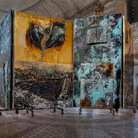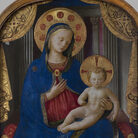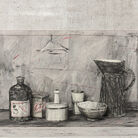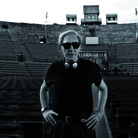Bertille Bak. Radice

BertilleBak, Banderole n.2
Dal 19 February 2016 al 23 April 2016
Roma
Luogo: The Gallery Apart
Indirizzo: via Francesco Negri 43
Orari: dal martedì al sabato 15-19 e su appuntamento
Telefono per informazioni: +39 06 68809863
E-Mail info: info@thegalleryapart.it
Sito ufficiale: http://www.thegalleryapart.it
The Gallery Apart è orgogliosa di presentare la prima personale in Italia di Bertille Bak (Arras, F, 1983), artista già ammirata dal pubblico italiano in occasione della sua partecipazione a “La voce delle immagini” a Palazzo Grassi a Venezia, mostra curata da Caroline Bourgeois con lavori di 27 artisti della Collezione Pinault, e ben presente in numerose collezioni pubbliche d’Oltralpe, tra cui quelle di FNAC, FMAC Paris, FRAC Collection Aquitaine, FRAC Alsace, FRAC Limousin e FRAC Basse- Normandie.
Radice, il titolo della mostra volutamente declinato dall’artista in italiano, a testimonianza della sua attitudine a calarsi integralmente nelle comunità che incontra nel dispiegarsi del suo lavoro, fa diretto riferimento tanto alle modalità attraverso cui Bak dipana il suo fare artistico, quanto ai contenuti intrinseci dei lavori esposti, scelti dall’artista anche tra quelli che ne hanno segnato gli esordi. Radice anzitutto in termini di storia personale, inizialmente legata al piccolo villaggio minerario di Barlin, attorno a cui ruotano anche alcune delle opere in mostra, luogo dove Bertille Bak, il cui nonno è stato un minatore, ha avuto per alcuni anni il suo studio. Radice quindi anche in termini collettivi, nel senso di radicamento territoriale delle comunità con cui l’artista entra in contatto e che formano oggetto della sua poetica. Ma radice richiama ovviamente anche l’etimologia e quindi i concetti di sradicare e di eradicare, che Bak sviluppa con riferimento non solo alle persone e alle loro storie, ma anche agli oggetti e alle architetture. Gli oggetti che Bak plasma lungo un asse portante che lega quotidiano, identità e tradizione e che assumono nuovi significati sia che appartengano alla categoria dell’objet trouvè o, più spesso, a quella dell’object produit. E le architetture, che l’artista riproduce sotto forma di disegni per fissare le facciate di edifici destinati a scomparire. O infine, radice come evocazione di radicale, aggettivo che ben si attaglia all’impegno politico-sociale che trasuda dal lavoro dell’artista.
Bertille Bak persegue infatti una visione sociologico-politica se non addirittura, come è stato notato, da etnologa. Le sue opere sono espressione di un processo operativo e di una formalizzazione. Il processo si fonda sul modus operandi dell’artista che si interessa e condivide la vita di comunità ai margini della cultura dominante al fine di stimolare una reazione non rivoluzionaria o violenta, ma che Bak definisce “rivolta alternativa” contro le decisioni intollerabili che rendono difficile la vita ai membri di tali comunità. La formalizzazione è l’espressione di tale approccio e del sentimento di empatia che unisce l’artista ai suoi compagni di strada e si concretizza in qualcosa che si dimostra più vicino alla fiaba che al documentario.
Bak esprime un’arte di relazione rivolta a comunità di persone più o meno consapevoli delle loro caratteristiche identitarie e a minoranze spesso dimenticate o represse. Nel corso di visite e lunghi soggiorni all’interno delle comunità di volta in volta prescelte, Bak costruisce relazioni interindividuali votate a generare consapevolezza dell’utilità sociale di persone e gruppi.
Mediante la condivisione del quotidiano, lo studio del territorio, l’analisi dei legami sociali, della cultura, delle tradizioni e dell’organizzazione economica, Bak si cala nel ruolo di agitatore sociale proponendosi come coscienza critica in grado di produrre consapevolezza politica nei suoi interlocutori. Ne scaturiscono ritratti collettivi colti da un punto di vista eccentrico, spesso basato sulla ricerca di mitologie individuali, in un ostinato tentativo di serbare tracce e di preservare la memoria. Non è un caso che Bak abbia lavorato come allieva di Christian Boltanski all’Ecole Nationale des Beaux-Arts di Parigi.
Bertille Bak interviene con opere video, installazioni, tessuti e performance che amplificano l’esperienza delle singole comunità rendendole messaggi universali. La sua personale rappresentazione del reale sfiora ma nel contempo evita la dimensione utopica, così come non arriva a concretizzarsi in una visione politicamente programmatica. Curiosità antropologica, impegno sociale, attivismo politico e soprattutto un uso civico e non romantico del sentimento della nostalgia producono una interpretazione intermedia della realtà volta ad affermare la possibilità di pensare e definire mondi diversi, che è possibile immaginare meccanismi sociali alternativi seguendo pratiche vicine più alla decostruzione e alla conseguente ricostruzione del reale che non al sogno e all’utopia.
Inaugurazione: 19 febbraio 2016, h.18
SCARICA IL COMUNICATO IN PDF
COMMENTI

-
 Dal 7 February 2026 al 27 September 2026
Milano | Palazzo Reale
Dal 7 February 2026 al 27 September 2026
Milano | Palazzo Reale
Anselm Kiefer. Le Alchimiste
-
 Dal 6 February 2026 al 3 May 2026
Torino | Musei Reali di Torino
Dal 6 February 2026 al 3 May 2026
Torino | Musei Reali di Torino
Beato Angelico negli occhi di Bartholomäus Spranger. Giudizi Universali a confronto
-
 Dal 6 February 2026 al 5 April 2026
Milano | Palazzo Citterio
Dal 6 February 2026 al 5 April 2026
Milano | Palazzo Citterio
Metafisica / Metafisiche. William Kentridge. More Sweetly Play the Dance and Remembering Morandi
-
 Dal 31 January 2026 al 26 April 2026
Roma | MAXXI Museo nazionale delle arti del XXI secolo
Dal 31 January 2026 al 26 April 2026
Roma | MAXXI Museo nazionale delle arti del XXI secolo
Franco Battiato. Un’altra vita
-
 Dal 3 February 2026 al 14 June 2026
Milano | Palazzo Reale
Dal 3 February 2026 al 14 June 2026
Milano | Palazzo Reale
I Macchiaioli
-
 Dal 30 January 2026 al 29 June 2026
Roma | Centro della Fotografia Roma
Dal 30 January 2026 al 29 June 2026
Roma | Centro della Fotografia Roma
IRVING PENN. PHOTOGRAPHS 1939 – 2007. Capolavori dalla collezione della Maison Européenne de la Photographie di Parigi


